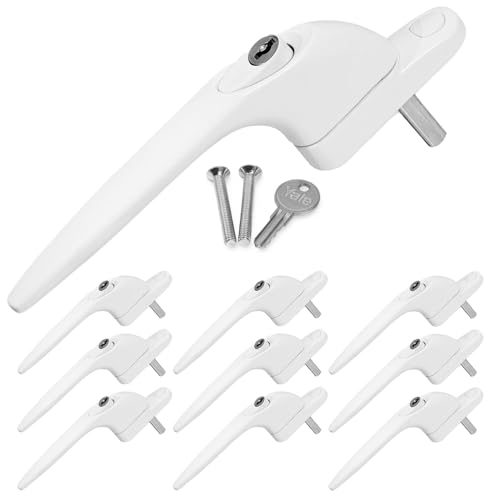How to check efficiency of double glazing

Double glazing is a popular choice for homeowners looking to improve the energy efficiency of their homes. It consists of two glass panes with a gap in between, filled with either air or gas. This design provides better insulation and reduces heat transfer, thus helping to decrease energy consumption and save on bills.
However, not all double glazing is created equal. While some may offer excellent energy efficiency, others may not be as effective. Therefore, it is important to check the efficiency of your double glazing to ensure that you are getting the full benefits.
There are several ways to assess the efficiency of your double glazing. One simple method is to check for draughts. Stand near the windows on a windy day and feel for any air coming through. If you feel a breeze, it indicates that there might be gaps or leaks in the double glazing, compromising its efficiency.
Another method is to check the insulation properties of the double glazing. A high-quality double glazing unit will have a low U-value, indicating that it has good insulation properties. The lower the U-value, the better the insulation. You can ask the manufacturer or installer for the U-value of your double glazing or use an infrared thermometer to measure the temperature difference between the inside and outside surfaces of the windows.
In addition to these methods, you can also look for the presence of condensation between the glass panes. Condensation suggests that the seals in the double glazing have failed, allowing moisture to enter. This not only reduces the insulation properties but can also lead to other problems, such as mold growth.
By using these methods, you can effectively check the efficiency of your double glazing and ensure that your home benefits from maximum energy efficiency and comfort.
Ways to Assess the Performance of Double Glazing
In order to ensure the efficiency and effectiveness of double glazing in your home, it is important to assess its performance regularly. Here are some ways to assess the performance of double glazing:
1. Visual Inspection
A visual inspection is the first step to assess the overall condition of your double glazing. Inspect the window frames, seals, and glass panels for any signs of damage, cracks, or warping. Look for any gaps or areas where air or moisture may be entering. Visual inspection can give you a general idea of the condition and performance of your double glazing.
2. Thermal Imaging
Thermal imaging is a helpful tool to identify areas of heat or energy loss in your double glazing. By using a thermal camera, you can detect temperature variations on the windows and identify potential areas of insulation failure. The thermal images will show you where the cold spots are, indicating the areas where your double glazing may not be performing optimally.
3. Condensation Test
Condensation on your double glazing can indicate poor insulation and low efficiency. Perform a condensation test by checking for any signs of moisture or fogging between the glass panels. If you notice condensation forming inside the sealed unit, it may be a sign of a broken seal and reduced insulation performance. A condensation test can help you identify any potential issues with your double glazing.
4. Energy Efficiency Ratings
Check the energy efficiency ratings of your double glazing to get a more accurate understanding of its performance. Ratings such as the U-value, solar heat gain coefficient (SHGC), and visible transmittance (VT) provide insights into the insulation properties, heat gain/loss, and light transmission capabilities of your windows. Higher ratings indicate better energy efficiency.
5. Professional Inspection
For a thorough assessment of the performance of your double glazing, it is advisable to hire a professional. They can measure the air leakage, perform a thermal performance test, and identify any weak points or deficiencies in your double glazing system. A professional inspection will provide you with a comprehensive evaluation and recommendations for improving the efficiency of your double glazing.
Regular assessment of the performance of your double glazing is essential to ensure its efficiency, eliminate potential issues, and save energy in the long run. By following these steps, you can stay on top of your double glazing’s performance and take necessary actions to improve its efficiency and effectiveness.
Energy Efficiency of Double Glazing
When considering double glazing for your windows, it’s important to understand its energy efficiency benefits. Double glazing is designed to improve the insulation properties of windows, thus reducing heat loss and lowering energy consumption.
How Does Double Glazing Work?
Double glazing consists of two panes of glass separated by a gap filled with either air or gas, typically argon. This gap acts as an insulating layer, preventing the transfer of heat between the inside and outside of a building.
Additionally, the glass panes are coated with a low-emissivity (low-e) coating, which helps to further reduce heat loss. This coating reflects heat back into the room, keeping the interior warmer during winter and cooler during summer.
The Benefits of Energy Efficient Double Glazing
1. Enhanced Thermal Insulation: The main benefit of double glazing is its improved thermal insulation. By reducing heat loss, it helps to maintain a comfortable temperature inside your home, regardless of the weather conditions outside.
2. Reduced Energy Consumption: Double glazing can significantly reduce your energy consumption by minimizing the need for heating or cooling systems. This not only saves you money on your utility bills but also reduces your carbon footprint.
3. Noise Reduction: Double glazing also provides effective noise insulation, creating a much quieter living environment. The two glass panes and the gap in between help to block out external sounds, creating a peaceful indoor atmosphere.
4. Condensation Prevention: Another advantage of double glazing is its ability to reduce condensation. The inner pane of glass remains closer to room temperature, thereby reducing the amount of moisture that forms on the window surface.
Overall, double glazing offers multiple energy efficiency benefits that can positively impact your home’s comfort, sound insulation, energy consumption, and maintenance. It is an investment that pays off in numerous ways, making it a smart choice for homeowners.
Evaluating the Soundproofing Capability of Double Glazing
When it comes to choosing double glazed windows, it is important to consider the soundproofing capabilities they offer. Noise insulation is crucial, especially if your property is located in a busy area, near traffic, or close to commercial spaces. Here are some factors to evaluate the soundproofing efficiency of double glazing:
1. Glass Thickness: Thicker glass tends to provide better soundproofing than thinner glass. When evaluating the efficiency of double glazing, consider the thickness of the glass used in the windows.
2. Air Gap: The air gap between the two panes of glass in double glazing plays a significant role in reducing noise transmission. A larger air gap, typically between 12mm to 20mm, provides better sound insulation.
3. Sealing: Proper sealing between the window frames and the glass panes will ensure that no sound leaks in or out. Inspect the quality of the sealant used in the double glazed windows and ensure there are no gaps or cracks.
4. Frame Material: The material of the window frame can impact the window’s soundproofing capabilities. Solid materials like uPVC or timber frames generally offer better sound insulation than aluminum frames.
5. Quality of Installation: Even the best double glazing can fail to provide efficient soundproofing if not installed correctly. It is important to choose a reputable company with experience in double glazing installation to ensure proper fitting and sealing of the windows.
6. Laboratory Testing: Look for double glazed windows that have undergone laboratory tests for sound insulation. Certifications from accredited independent testing facilities can provide assurance of the product’s soundproofing capabilities.
7. Customer Reviews: Take the time to read customer reviews and testimonials regarding the soundproofing performance of the double glazed windows you are considering. Feedback from other customers can provide valuable insights into the efficiency of the product.
Overall, evaluating the soundproofing capability of double glazing involves considering factors such as glass thickness, air gap, sealing, frame material, quality of installation, laboratory testing, and customer reviews. By thoroughly assessing these aspects, you can choose double glazed windows that offer excellent sound insulation for your property.












